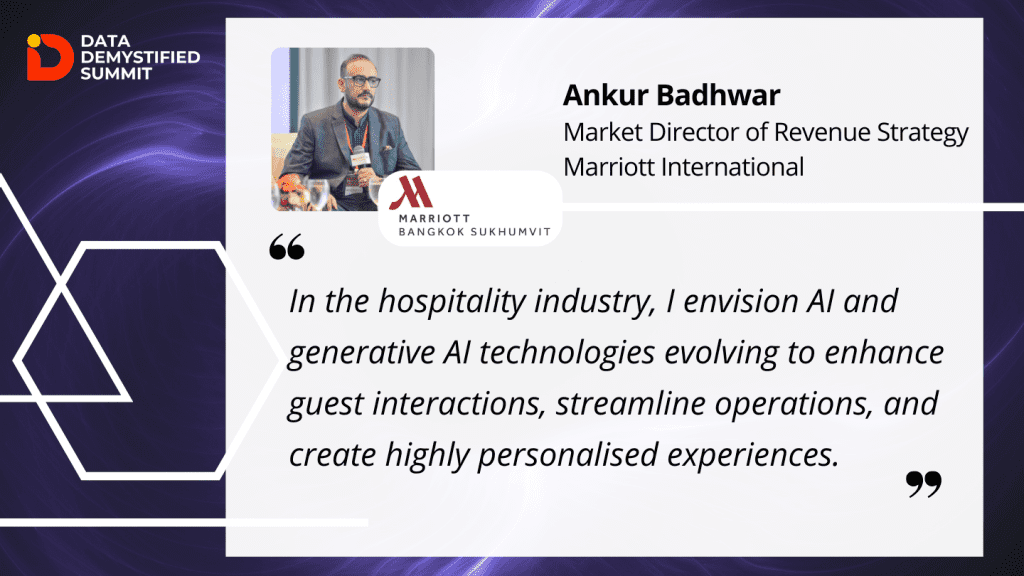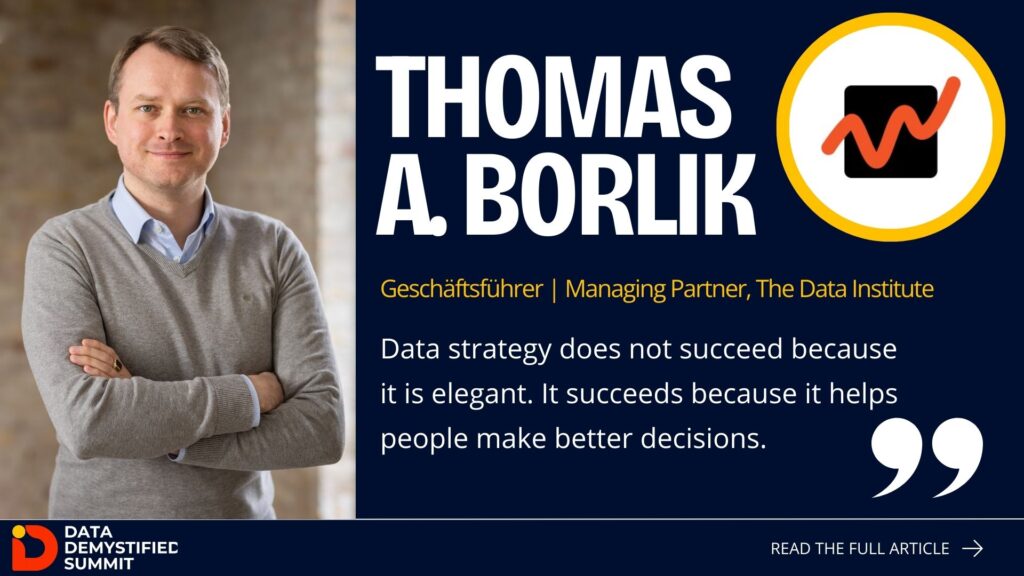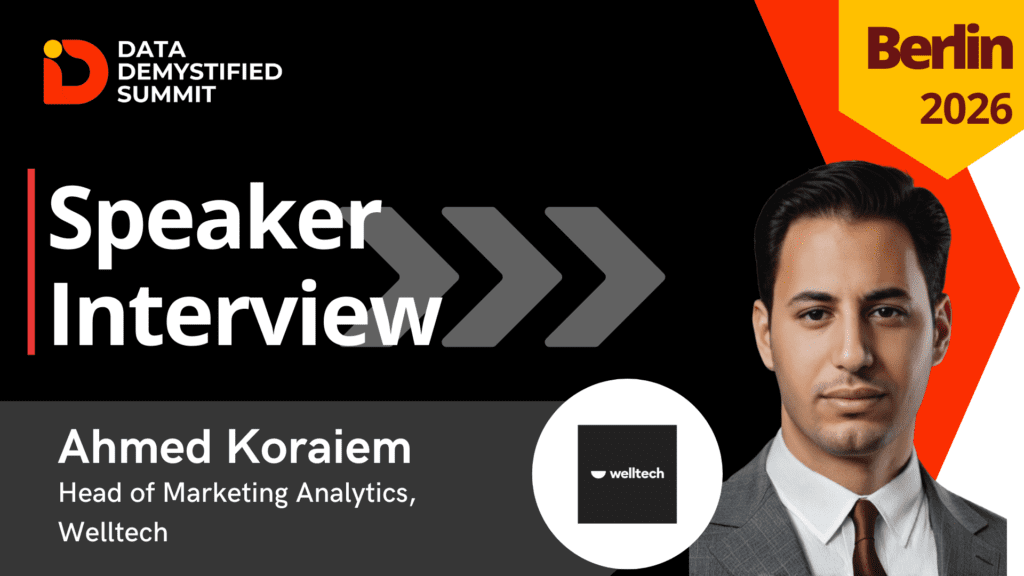
Welcome Ankur Badhwar, Market Director of Revenue Strategy at Marriott International, sharing his insights on how data, AI, and evolving business intelligence are redefining the hospitality industry in Data Demystified Thoughts series.
In the dynamic world of hospitality, the role of data has grown from simple performance metrics to an essential driver of strategic decision-making. Ankur Badhwar, Market Director of Revenue Strategy at Marriott International, leverages advanced data analytics and artificial intelligence to shape impactful strategies that enhance guest experiences, optimize revenue, and foster operational efficiency.
How do you describe your job to a 5-year-old?
I help hotels make sure guests have a fantastic time when they visit. I talk to people who want to stay at the hotel and help them find the best rooms. I also help the hotel make decisions, like setting room prices so that everyone is happy, and the hotel can earn money by looking at past trends and future demand.
What excites you most about data, data analytics, or data technology, and why?
What excites me most about data analytics is the ability to uncover patterns and insights that aren’t immediately obvious. In the hotel industry, for instance, data can reveal guest preferences, booking trends, and pricing opportunities that significantly enhance the guest experience and drive revenue.
The power of data technology lies in transforming raw information into actionable strategies—using business intelligence tools or Co-Pilot technologies, for example, to stay ahead of competitors and make smarter decisions. It’s like having a secret map that guides us towards better results, benefiting both the business and our guests.
What data analytics software are you most familiar with?
I’ve worked extensively with several data analytics tools crucial in the hotel industry. Some key platforms I’m familiar with include Revenue Management Systems (RMS) like IDeaS, One Yield, and Duetto, which assist with dynamic pricing and demand forecasting.
Additionally, I’ve used business intelligence tools that integrate data from multiple sources to generate comprehensive reports and insights. I’m also familiar with Co-Pilot technologies, which enhance predictive analytics, allowing us to anticipate trends and optimise hotel operations. These tools have been essential in leveraging data to boost both revenue and guest satisfaction.
How do you see the skill sets needed in the data science profession changing?
The skill sets in data science are evolving beyond just technical expertise. While proficiency in programming languages like Python, SQL, and tools such as machine learning models will remain important, I see a growing need for business acumen and industry-specific knowledge. Data scientists will need to understand not only how to analyse data but also how to apply those insights to real-world business challenges—whether it’s optimising hotel revenue, personalising guest experiences, or predicting market trends.
Additionally, as automation and AI-driven analytics tools become more advanced, the ability to interpret and communicate data insights effectively will become crucial. Data scientists will need to shift from being purely technical experts to strategic partners who influence decision-making and bridge the gap between data and business impact.
What was your most successful or most challenging data analysis project?
One of my most successful yet challenging data analysis projects involved streamlining hotel payment solutions to enhance the guest experience. The objective was to integrate data from various departments—finance, operations, and guest services—to identify inefficiencies in the payment process. Using a combination of business intelligence tools and predictive analytics, I tracked patterns in payment delays, guest behaviour, and their impact on satisfaction.
In the end, we improved the payment process, reduced delays, and enhanced the overall guest experience by implementing real-time payment updates. This project taught me the importance of combining technical skills with clear communication to drive tangible business improvements.
In what ways have you implemented advanced analytics to drive decision-making within your organisation? Can you share a specific use case where advanced analytics provided significant business value?
I’ve implemented advanced analytics in numerous ways, with one notable example in revenue management. We use Power BI to integrate data from sources such as competitor pricing, historical booking data, and market demand trends to create more dynamic pricing models. By leveraging machine learning algorithms, we forecast demand more accurately and adjust room rates in real-time based on current and predictive market conditions.
During a period of fluctuating tourist arrivals, advanced analytics helped us identify a surge in last-minute bookings from specific markets that traditional reports hadn’t highlighted. This allowed us to adjust pricing and availability promptly, leading to a significant increase in occupancy and revenue without compromising guest satisfaction.
This project demonstrated how advanced analytics provides not only financial benefits but also operational agility, enabling us to respond quickly to market changes and stay ahead of competitors.
Which tools do you prefer for data visualization and why? What are common mistakes to avoid in data visualization?
I prefer using Tableau and Power BI for data visualisation due to their user-friendly interfaces and powerful capabilities for creating interactive, insightful dashboards. They also integrate seamlessly with various data sources, enabling real-time updates.
Common mistakes in data visualisation include overcrowding visuals with too much information, using inappropriate chart types that can mislead the audience, and neglecting to label axes and data points clearly. It’s essential to keep visualisations simple, focused, and intuitive to ensure insights are easily understood.
How have you integrated machine learning or deep learning techniques into your data analytics workflow? Can you discuss a successful application and its impact on your business?
I’ve integrated machine learning techniques into my data analytics workflow primarily for predictive analytics and revenue optimisation. One successful application involved using a machine learning model to analyse historical booking data, guest demographics, and seasonal trends to forecast demand for specific periods. By implementing this model, we were able to adjust our pricing strategies dynamically based on predicted occupancy rates and market conditions. For instance, during a low-demand season, the model identified opportunities to offer targeted promotions to specific customer segments, significantly increasing bookings.
What is the most effective use of technology you’ve seen in navigating today’s rapidly changing and diverse world?
The most effective use of technology I’ve seen in navigating today’s rapidly changing world is the implementation of cloud-based collaboration tools and data analytics platforms. These technologies enable organisations to remain agile and responsive, regardless of location or workforce diversity.
For instance, in the hospitality industry, tools like cloud-based property management systems and real-time data analytics allow teams to access critical information from anywhere.
What are the key challenges when implementing new technologies or platforms for the first time in your company, and do you have any suggestions for making the process smoother?
The key challenges when implementing new technologies or platforms for the first time include resistance to change, data integration issues, and ensuring that staff are adequately trained to use the new tools. Employees may be hesitant to adopt new systems, especially if they are comfortable with existing processes. Additionally, integrating new technology with legacy systems can lead to data discrepancies and operational disruptions.
To make the process smoother, I suggest the following:
- Engage Stakeholders Early
- Provide Comprehensive Training
- Start with a Pilot Programme
What are the biggest challenges you face in data management within your organisation?
The biggest challenges in data management within my organisation include ensuring data quality and accuracy, as inconsistent data can lead to misleading insights and poor decision-making. Additionally, data integration across various systems and departments poses a challenge, as disparate sources can hinder our ability to gain a holistic view of performance and customer behaviour.
To address these issues, I implement a robust data validation and cleansing process that involves regular audits to identify and rectify inaccuracies, as well as establishing standardized data entry protocols to ensure consistency across all sources.
Can you share your experience with a recent data migration project? What challenges did you face, and how did you mitigate any associated risks?
We are working on moving our customer data from a legacy system to a new cloud-based platform. One of the key challenges is data integrity during the transfer, as discrepancies in data formats and structures could lead to potential loss of information. To mitigate these risks, we developed a comprehensive migration plan that included data mapping to identify how data would translate between systems, as well as conducting extensive testing in a sandbox environment.
How is AI helping your organisation manage and process vast amounts of data? Can you provide an example of how AI has improved your data management processes?
AI is significantly helping our organisation manage and process vast amounts of data by automating data analysis, identifying patterns, and streamlining workflows. For example, we implemented an AI-driven analytics platform that analyses booking trends and customer behaviour in real-time, allowing us to optimise pricing strategies dynamically. One specific instance involved using AI to predict peak booking periods based on historical data and external factors like local events. This enabled us to adjust our marketing efforts proactively and allocate resources more effectively, leading to a 20% increase in occupancy during peak times. Overall, AI has enhanced our ability to derive actionable insights from data, improving our decision-making processes and operational efficiency.
With increasingly strict regulations around data privacy, how does your organisation approach data ethics?
Our organisation takes a proactive approach to data ethics, prioritising transparency and compliance with regulations like GDPR and CCPA. We have established a robust framework that includes regular training for employees on data privacy principles, clear data governance policies, and mechanisms for obtaining explicit consent from customers before collecting or using their data.
For example, when we launched a new customer loyalty programme, we ensured that our data collection practices were ethical by providing clear information to participants about how their data would be used and giving them the option to opt in or out.
How do you see generative AI and large language models transforming your industry? Have you implemented any generative AI solutions, and if so, what outcomes have you seen?
I see generative AI and large language models transforming the hospitality industry by enhancing customer interactions, streamlining operations, and personalising marketing efforts. These technologies can automate responses to customer inquiries, generate tailored content for marketing campaigns, and even assist in creating personalised guest experiences. For example, we can use chatbots powered by large language models to handle routine guest inquiries and reservations.
What are the biggest challenges you face when integrating AI into your organisation, and how do you overcome them? How do you measure the success of AI implementations?
The biggest challenges we face when integrating AI into our organisation include data quality and availability, ensuring that we have sufficient high-quality data to train AI models effectively, and addressing employee resistance to change, as some team members may be apprehensive about adopting new technologies.
To overcome these challenges, we focus on improving our data governance practices to ensure that data is clean, consistent, and readily accessible for AI initiatives. We also invest in training and change management programmes to help employees understand the benefits of AI and how it can enhance their roles rather than replace them.
Looking ahead, how do you envision AI and generative AI technologies evolving, and what are your organisation’s plans to stay ahead of the curve?
In the hospitality industry, I envision AI and generative AI technologies evolving to enhance guest interactions, streamline operations, and create highly personalised experiences. For instance, advancements in natural language processing could enable more sophisticated chatbots that understand and anticipate guest needs, while predictive analytics could optimise pricing and inventory management in real-time.
To stay ahead of the curve, our organisation plans to invest in continuous training for our staff, ensuring they are equipped to utilise the latest AI tools and technologies effectively. We also aim to explore partnerships with AI technology providers to implement cutting-edge solutions, such as AI-driven recommendations for guests based on their preferences and behaviours. By fostering a culture of innovation and agility, we can leverage these technologies to elevate our services and enhance guest satisfaction, ultimately driving loyalty and revenue in a competitive market.
How do you keep abreast of all the latest technology out there?
I keep abreast of the latest technology by regularly reading industry publications and blogs, subscribing to newsletters from tech-focused organisations, and participating in webinars and online courses. I also engage with professional networks and communities, both online and in-person, to share insights and learn from peers. Attending industry conferences and events is another valuable way to stay updated on emerging trends and innovations, as it allows me to connect with thought leaders and explore new technologies first-hand.
Any fun facts about yourself that you want to share?
I enjoy exploring new culinary experiences and often experiment with cooking dishes from different cultures at home. I also have a passion for travel and have visited over 20 countries, which has inspired me to incorporate various international flavours into my cooking. Additionally, I’m an avid fan of hiking and love spending time outdoors, as it helps me recharge and brings me closer to nature.
What’s the best advice someone has ever given you?
The best advice I’ve ever received is to embrace failure as a learning opportunity. This perspective has helped me approach challenges with resilience, understanding that setbacks can lead to valuable insights and personal growth. It encourages me to take calculated risks and continuously seek improvement, both personally and professionally.
A big thank you to Ankur Badhwar, for sharing your journey and forward-thinking strategies with us in Data Demystified Thoughts series. Ankur Badhwar’s insights underscore the critical role of data and AI in driving the future of the hospitality industry. If you want to connect with Ankur after reading his Data Demystified Thoughts, please reach out via his LinkedIn Profile!
See more Data Demystified Thoughts interview pieces here!
Last updated: November 2024







